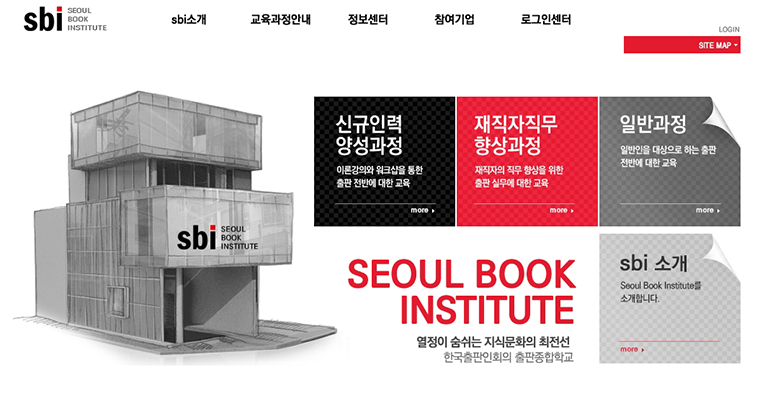|
South Korea's budding publishing experts
2018.01
University education inside South Korea to create experts in the publishing industry peaked in the 1990s. This was reflected in how even regional universities outside the capital area created new majors for this purpose while more than 10 two-year community colleges also did the same. There were also several locations that used the title "electronic publishing". Currently there is only one four-year university that has a publishing related major(Semyung University) and two two-year colleges(Shingu College, Seoil University). In today's modern world where job education is key, the number of majors at universities might as well be a barometer for how successful that field is. And this change shows well how things have greatly changed from 20 years ago when there was a surge of those working in the publishing industry.
On the other hand, there is a need to note not many publishers require their workers to have studied in a related major in university. From a publisher's point of view, editors need to be someone who can edit rather than someone who has studied the subject material. Most felt when it comes to marketers or designers, their college majors are not that important either. Working abilities needed for the production or sales of publications depends on how much you have learned on the field, than what your academic background might be.
Compared to the decline of public education, the role of private education institutions that focus on actual field work is growing. Most of them offer a several month-long course that teaches the details of the industry and has students carrying out actual tasks. For instance, a publishing education institution called Seoul Book Institute(SBI) is one of them. It was established by the Korean Publisher Society and has been operating education courses since 2005. It has 25 lecture courses for new recruits, current workers and those outside the industry. The courses aimed at creating experts in the publishing industry are largely divided into three: publishing editors, publishing marketers and publishing designers. In the courses that encourage the improvement of current publishing industry workers, detailed courses on planning picture books, publishing e-books and calculating the price of publication are available. Recently the institute saw more than 700 people completing its courses every year.
Among non-publishing industry institutions, the Hankyoreh Education Culture Center's lectures are also well known. Compared to other private education facilities, this location stands out for its publishing related services, and has courses on editing, enhancing work task abilities, becoming an editor, the basics of creating e-books and design. For those looking to boost their performance, courses like the skills of editing, translating, survival techniques of publishing startups, children's book publishing and publication planning are provided. As South Korea is a country where many translated works are circulated in the book market, there are 17 classes alone on translations and especially those dealing with English and Japanese. By lecture, there are usually six to 12 classes(each spans two hours) and most of the courses can be taken with government support.
Meanwhile, in South Korea's education system, some graduate schools offer publishing related majors. Some universities in Seoul that do not offer publishing classes for undergrad students do offer them in their graduate school programs(Chung Ang University, Kyung Hee University, Sogang University, Kunkuk University) and help current workers in the publishing industry study and work at the same time to obtain master's degrees. Here the classes are not focused on field work but rather academic studies and research. It shows South Korea's cultural emphasis on education and degrees.
Aside these, South Korea's University of Polytechnics that has 34 campus locations throughout the country is a school to teach skills and non-degree job training sessions are available like publishing design and digital content. The short-term education courses are free of charge. KPIPA has also operated classes based on demand, including those like publishing, marketing, digital publishing, bookstores and publication exports. Korea Federation of Bookstore Association also offers classes several times a year on a non-regular basis via financial support from the government for those who wish to open their own bookstores or those who operate them already.
Like the above, there are many locations in South Korea apart from universities and graduate schools like private education facilities and government run institutions that provide a number of classes on publishing. Recently, provincial governments like Seoul and Gyeonggi Province have been running classes for bookstore operators or those who plan on opening bookstores. This reflects the growing trend of classes focused on new demands in the market for things that are useful in the field.
Written by Won-keun Baek (Books & Society Research Institute, President) Won-keun Baek (Books & Society Research Institute, President) |
Pre Megazine
-

Export Prospects of Korean Books
VOL.1
2017.06 -

Current State of Korean Publishing
VOL.1
2017.06 -

Korean Bestsellers Trend in June
VOL.1
2017.06 -

Export Prospects of Korean Books
VOL.2
2017.07 -

South Korea's publishing industry
VOL.2
2017.07 -

South Korea's July Bestsellers
VOL.2
2017.07 -

Export Prospects of Korean Books
VOL.3
2017.08 -

South Korea's digital publishing industry
VOL.3
2017.08 -

South Korea's August Bestsellers
VOL.3
2017.08 -

Export Prospects of Korean Books
VOL.4
2017.09 -

Changes in South Korea's reading demographics
VOL.4
2017.09 -

South Korea's September Bestsellers
VOL.4
2017.09 -

Export Prospects of Korean Books
VOL.5
2017.10 -

South Korea's Printing Industry
VOL.5
2017.10 -

South Korea's October Bestsellers
VOL.5
2017.10 -

Export Prospects of Korean Books
VOL.6
2017.11 -

South Korea's Key Publishing Related Organizations
VOL.6
2017.11 -

South Korea's November Bestsellers
VOL.6
2017.11 -

Export Prospects of Korean Books
VOL.7
2017.12 -

South Korea's Major Online Bookstores
VOL.7
2017.12 -

South Korea's December Bestsellers
VOL.7
2017.12 -

Export Prospects of Korean Books
VOL.8
2018.01 -

South Korea's budding publishing experts
VOL.8
2018.01 -

South Korea's January Bestsellers
VOL.8
2018.01 -

Guadalajara Book Fair 2017 Book from Korea
VOL.8
2018.01 -

Export Prospects of Korean Books
VOL.9
2018.05 -

South Korean Government Policies to Shore Up the Publishing Industry
VOL.9
2018.05 -

South Korea's April Bestsellers
VOL.9
2018.05 -

Overseas Publication Grants
VOL.9
2018.05 -

Overseas Publication Grants
VOL.10
2018.06 -

Aggregate data as of the fifth week of May
VOL.10
2018.06 -

South Korea’s Digital Publishing Contents Platform
VOL.10
2018.06 -

Export Prospects of Korean Books
VOL.10
2018.06 -

South Korea's June Bestsellers
VOL.11
2018.07 -

Overseas Publication Grants
VOL.11
2018.07 -

South Korea’s Library Status
VOL.11
2018.07 -

Export Prospects of Korean Books
VOL.11
2018.07









